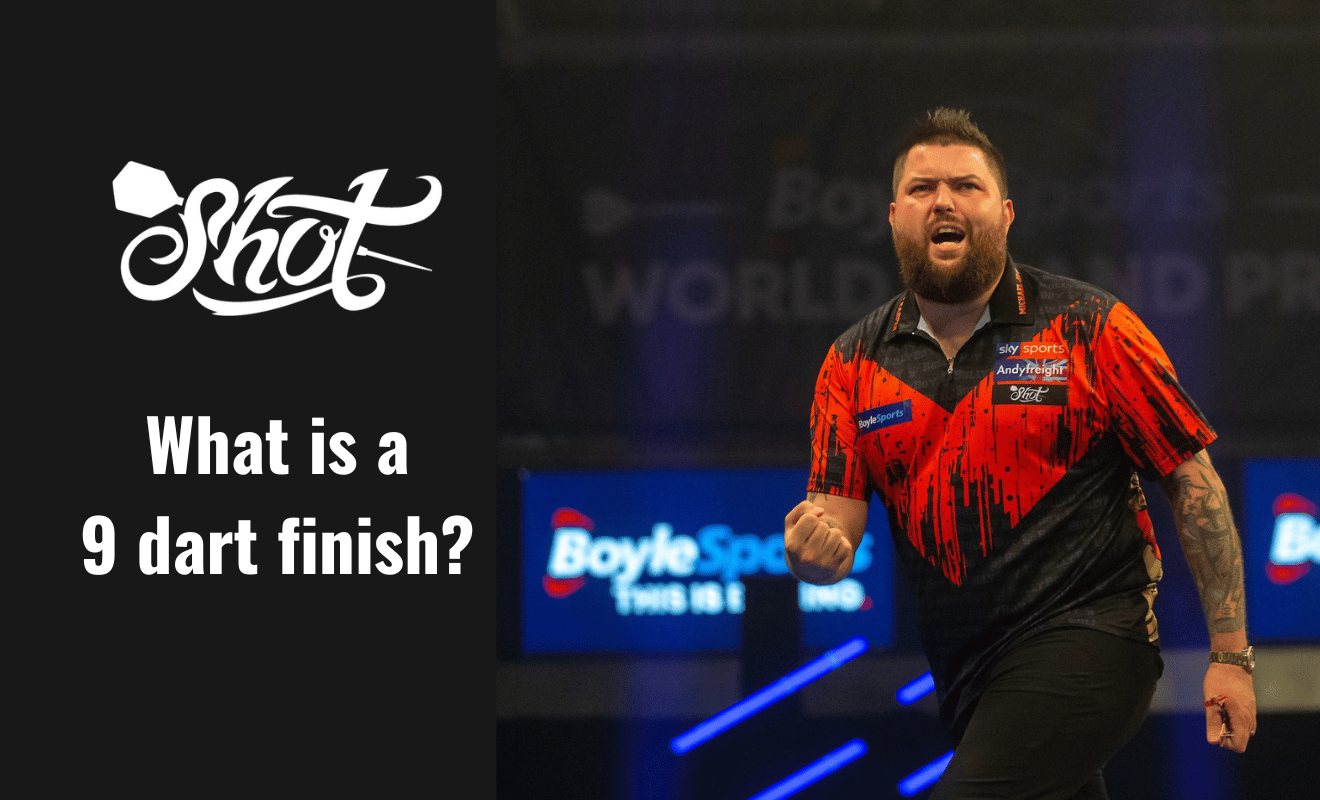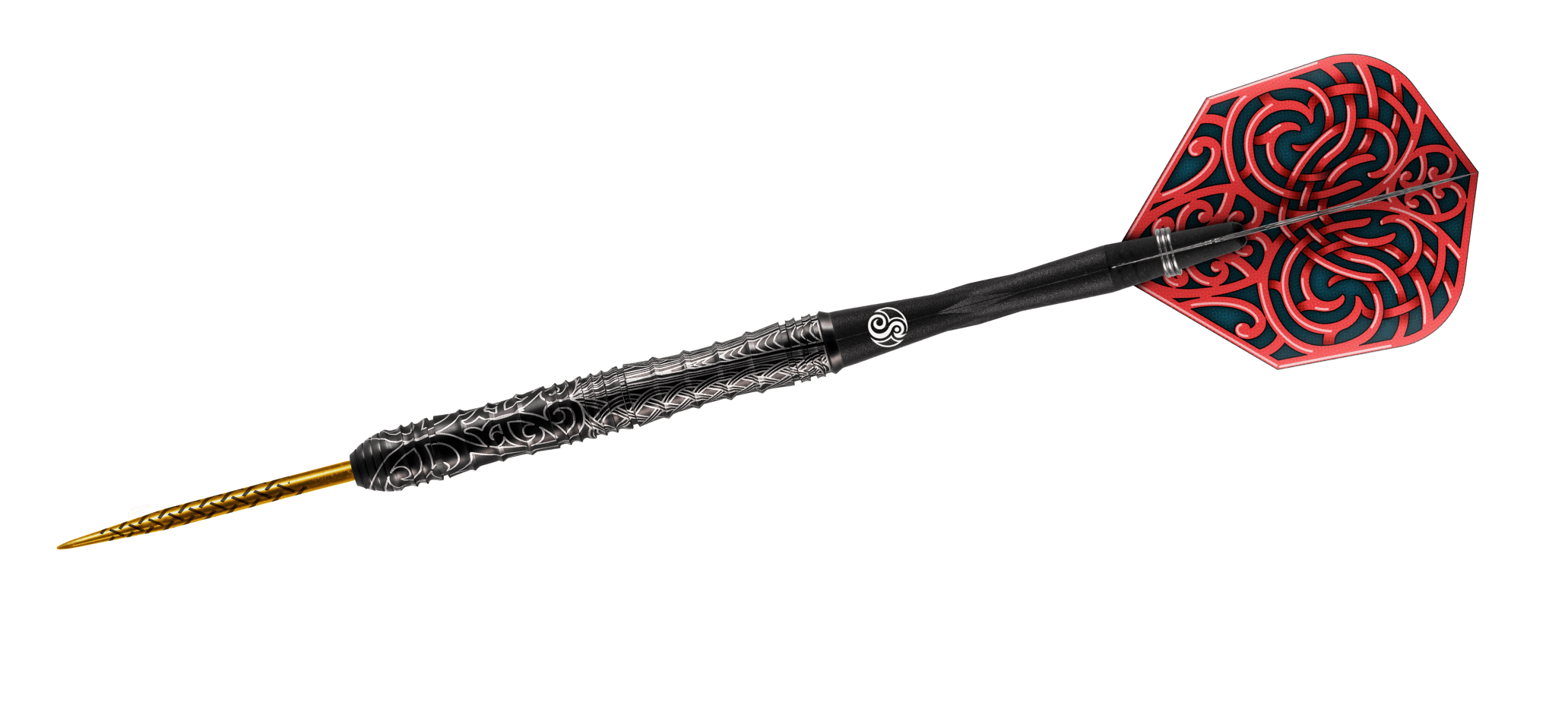Shot Darts jargon buster

All that darts jargon, explained
Like any sport with a bit of history behind it, darts has developed its own rich lingo. Hard for new players to know what the heck everyone’s talking about. And no one wants to get caught out not knowing their black hat from their white horse. So we’ve cobbled together a selection of the most common, obscure and just plain weird darts terminology to add to your vocabulary (and possibly help you out at pub quiz).
If you’d like the right gear and some idea, check out Choosing the right dart The parts of a dart and What are darts made of? for more technical know how..
Annie's room/house: The number 1
Arrows: another name for darts (also ‘sticks’)
Archer: a player who throws quick smooth darts, like an archer's arrow (also known as a 'derek'). The opposite of a ‘floater’.
Baby ton: a score of 95, usually by scoring five 19s
Bag o' nuts: a score of 45
Barrel: the heavy, metal part where you grip the dart
Bed: a section of a number / a scoring area of the board i.e. Double bed, treble bed
Black hat: the inner bullseye when the centre is black
Bombs / bombers: very large or heavy darts usually made from brass
Bounce out: the dart falls out of the board or hits the wire and doesn’t score
Bucket/bag of nails: landing all three darts in the 1 section
Buckshot: when darts land randomly all over the board
Bull-out: winning a game with a double bullseye
Bullseye: the centre of the board, sometimes called a cork
Busted: a higher score than you need in an ’01 game
Chalking: keeping score
Chucker: a player who ‘chucks’ darts, rather than aiming
Circle it: When a player scores a less than 10 with a three dart turn, team-mates shout ‘circle it!’ to highlight the terrible throw on the scoreboard. The circle is often a fish, leading to aquarium-related jokes about unlucky players
Clock: the dartboard, often used when playing Round the clock
Cork: describing the centre of the dartboard, originating from the early days, days when the ends of kegs were used for targets
Dartitis: describes the mental state of a dart thrower who can’t release their dart during a throw
Devil: a score of 666, often hit when the player’s going for triple 13 or triple 10
Diddle for the middle: a single throw to see who gets closest to the bullseye to determine who throws first (aka ‘bull off’, ‘middle for middle’, ‘out for bull’)
Double: the thin outer metal ring of the board, usually counting for 2x the number hit
Double-bull: Hitting the red circle on dartboards with a bullseye of two concentric circles, where the outer circle worth 25 is usually green, and the inner circle worth 50 is red.
Downstairs: The lower portion of the board, usually in reference to the 19s in a game of x01.
Easy in: a game that requires no special shot to start scoring
Fat: the fattest part of the wedge of a number, between the double and triple ring)
Flights: the wings at the end of a dart that make it fly straight (aka feathers)
Game on: lets players know the game has started
Game shot: lets players know the match-winning double has been hit
Hail Mary: your miraculous third dart scores a high treble, when the first two scored low singles
Hat trick: a score of three bullseyes in a single throw
High ton: scoring 151-180 points in one turn in a game of '01
Hockey: the throw or toe line (aka oche, pronounced hockey)
Island: the playable area of a dart board (inside the doubles ring). If you miss this area you could be off the island
Killer: a game where each players own a number on the dartboard and try to "kill" other players by removing the lives they have built up
Leg: one game of a match – most professional matches are made up of sets, which are split into legs
Leg shot: a player has won the ‘leg’ as per game shot
Lipstick: the treble twenty made famous by darts commentator Sid Waddell
Little/small: the skinny end of the wedge between the bullseye and the triple
Low ton: scoring 100-150 points in three throw turn in a game of '01
Mad house: the double-1 – a score that both makes you crazy and is really tricky to get out of in a game of ’01 (i.e. once a player has a score of 2 left, the only way to finish is to score a double-1)
Maximum: a score of 180
Maximum check-out: scoring 170 to end a game – treble-20, treble-20, inner bullseye
Motown: scoring 44 finish – a single 4 and double 20 (tops) – named for the Motown group the Four Tops.
Mugs away: whoever lost the previous game goes first
Not old: A score of 37, possibly inspired by a Monty Python sketch
Perfect game: 9 darts – the lowest number of darts to win a leg of 501
Perfect score: 180 points in one throw of three darts
Perfect finish: finishing a game with a maximum score of 170, by scoring treble 20, treble 20, double bull, with only three darts. Much harder than hitting a perfect score, as it requires breaking focus to change targets and only possible if they have exactly 170 remaining
Points: the sharp point of the dart that hits the board, steel tipped or soft tipped plastic
Robin hood: landing a dart in the shaft of another player’s dart
Round of terms: throwing 3x triples in one turn in Cricket
Route 66: scoring 66 points in one throw
Round the clock: describes games where the winner is first to hit all segments on the board in an agreed order (usually 1-20), finishing with the outer bullseye and then the bullseye. Often played by single players as practice.
Shaft /stem: the part of a dart behind the barrel where flights are mounted
Shanghai: scoring a single, double and triple in the same number. Shanghai also sometimes refers to a checkout of 120 (single, treble and double 20). No one seems to know exactly where this term came from.
Shooter: a dart thrower (the term is American in origin)
Shut out: losing a game without scoring in it
Single bull: see bullseye
Slop/sloppy/splash: darts that score, but not where you wanted them to
Spider/web: the wires that divide the scoring segments of a dartboard
Splitting the 11: landing a dart between the digits of the 11 on the number ring
Stacker: a dart that lands on top of and touches a previous dart to create a stacked effect
Straight out/single out: ending an '01 game without having to hit a double e.g.. 10 needed, and hitting 10 rather than needing to hit double 5
Striking oil: hitting a double bull when ‘diddling for the middle’
Three in a bed: throwing three darts in the same number
Throw line/toe line/oche: the line you stand behind and throw darts from also
Ton: a score of 100 in a game of ’01.
Ton plus: scoring 100+ points in a throw (ton 30 = 130 points)
Tops: the double 20 bed e.g. ‘she needs tops to win the match’.
Triple/treble: the thin inner ring on the dartboard, usually worth 3x times the number hit
Trombones: scoring 76 points in one throw
Two n six: scoring 26 points in a throw (English for two shillings and sixpence)
Two fat ladies: just like bingo, scoring 88 points in a throw
Under stacker: dart landing underneath and touching a previous dart
Upstairs: the upper portion of the board
Wet feet (or paddling): having one or both feet over the throwing line (a no-no)
White horse: scoring three virgin (untouched) triples in cricket.
Wire: darts that just miss where you aimed but hit the wire
Woody: when a dart lands outside the scoring area
X: signifies a double, e.g. X1 out





.jpg)